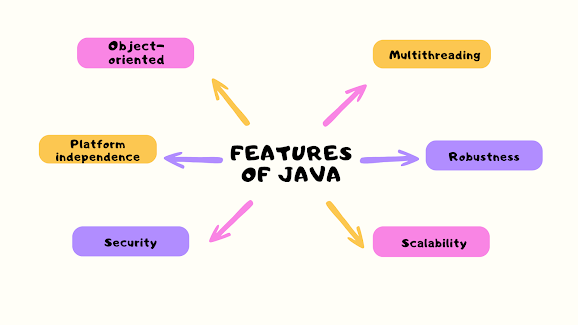Popular programming language Java is known for its ease of use and adaptability. Here are some of its major features:
- Object-oriented: Java follows the object-oriented programming (OOP) approach, which means it organizes code into objects that have properties (attributes) and behaviors (methods). This allows for modular and reusable code.
- Platform independence: Java programs can run on different operating systems and hardware platforms without any modifications. The Java Virtual Machine (JVM), which converts Java code into a format that the system on which it runs can understand, allows this.
- Automatic memory management: You don't need to manually create and deallocate memory since Java handles memory management. Writing bug-free code is made simpler by the garbage collector that automatically releases memory by deleting objects that are no longer needed.
- Robustness: Java is designed to be robust and reliable. It includes features like exception handling, which allows programmers to handle errors gracefully, preventing crashes and unexpected behavior.
- Security: Java has built-in security features that protect against unauthorized access and malicious code. The JVM enforces security measures such as sandboxing, which isolates Java programs from the underlying system, reducing the risk of security breaches.
- Rich standard library: Java comes with a vast collection of pre-built classes and methods, known as the Java Standard Library. This library provides a wide range of functionality, including input/output operations, networking, data structures, and more, saving developers time and effort.
- Multithreading: Java supports multithreading, which allows programs to execute multiple tasks concurrently. This is especially useful for applications that need to handle multiple user interactions or perform background tasks without blocking the main program.
- Portability: Java's platform independence and widespread adoption make it highly portable. Once a Java program is written, it can be run on any system that has a compatible JVM, making it easy to distribute and deploy applications.
- Scalability: Java supports scalability, which means it can handle the growing demands of an application. It provides features like thread pooling, which allows efficient utilization of system resources, and the ability to distribute workloads across multiple machines or servers.
- Community support: Java has a large and active community of developers. This means there are plenty of online resources, forums, and libraries available to help you learn and solve problems. The community also contributes to the continuous improvement of Java through updates and new libraries.
- Documentation: Java has extensive documentation, including official guides, tutorials, and API references. This documentation helps developers understand the language and its various libraries, making it easier to write clean and maintainable code.
- Robust ecosystem: Java has a vast ecosystem of third-party libraries and frameworks. These libraries cover a wide range of functionalities, such as database connectivity, user interface development, testing, and more. Leveraging these resources can speed up development and enhance the capabilities of Java applications.
These features contribute to Java's popularity and widespread use across various industries and application domains. Whether you're building small applications or large-scale systems, Java provides a solid foundation for developing reliable and robust software.
These features make Java a versatile language suitable for a wide range of applications, from desktop software to web development, mobile apps, and even large-scale enterprise systems.
Thank you guys.


No comments:
Post a Comment